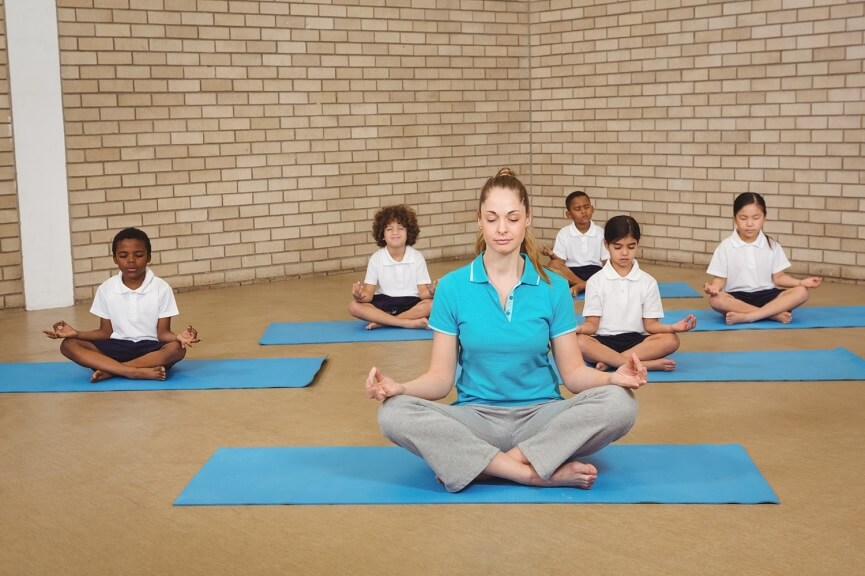The Role of Yoga in Creating a Balanced Student Life

Yoga is a practice that utilises postures, breathing, and meditation to promote physical and mental well-being. These practices improve flexibility, strength, and balance while reducing stress and enhancing mindfulness. In the past few decades, yoga has become very famous throughout the world. Yoga is a practice that can be tailored to any individual’s needs, which means almost everyone can benefit from it. Here, we will explore the role of yoga in creating a balanced student life.
About Yoga and Meditation
Students should know that yoga is closely related to meditation, the practice of cultivating focused awareness through techniques such as mindfulness, breath control, and concentration. Yoga deepens the mind-body connection and improves mental clarity, emotional balance, and stress management. The overall goal of both practices is to attain a state of self-awareness, inner peace, and personal growth. Besides contributing to academic success, the routine practice of yoga and meditation helps maintain overall wellness and emotional strength.
Yoga for Mental Health
This age-old practice goes beyond mere physical fitness and into deep mental wellness territory. Yoga enhances mindfulness and relaxation, enabling a person to better deal with stressful situations, build resilience emotionally, and enjoy life with greater inner peace. Whether one undergoes simple breathing exercises or some of the very complex meditative practices, it helps to focus the mind, enabling an individual to get through the day with much higher clarity and concentration. Here are a few ways in which yoga can positively impact your mental well-being:
- Reduce stress and anxiety: Yoga for mental health activates the parasympathetic nervous system, helping to lower stress and anxiety levels. Practices such as deep breathing, physical postures, and meditation work harmoniously to calm the mind and body, promoting overall mental well-being and helping you maintain a healthy, balanced state.
- Emotional well-being: Yoga contributes to emotional well-being by producing endorphins, which are natural “feel-good” hormones in the body. Habitual practice reduces anxiety, stress, and depression and leads to a more positive and balanced emotional state, hence bettering one’s mental well-being as a whole.
- Concentration and memory: Yoga enhances concentration and memory because it calms the mind and increases blood circulation to the brain. Increased circulation develops new neural connections, and hence, the cognitive functions improve.
- Mindfulness: Yoga also fosters mindfulness through deep breaths, proper breathing techniques, and increased awareness of body sensations, thereby promoting mental clarity with less stress and higher emotional self-regulation.
Benefits of Yoga for Students
Yoga has many advantages for students in both academic excellence and health. It helps control stress and boost concentration during high-pressure times like exams or project deadlines. Improvements in concentration, memory recall, and emotional toughness are assured through regular practice of yoga. There is also an improvement in physical health to sustain prolonged study hours. By integrating yoga into their daily routine, students can cultivate a balanced and peaceful mind, empowering them to perform better in both academics and life.
- Attention during study: By practising yoga, students are much more focused during study sessions. Practices such as pranayama increase oxygen flow to the brain, which can enhance mental function and attention span. The asanas help reduce physical stress.
- Exam stress: Students can stay calm and composed during exam season if they are engaged in regular yoga sessions. Breathing techniques like deep breathing and alternate nostril breathing will help in calming the nervous system and reduce anxiety.
- Meditation: Guided meditations and mindfulness practice help students manage stress and maintain a positive mindset.
- Better physical fitness and health: Students who practise yoga will be fit and healthy – both mentally and physically. Yoga contributes to strength, flexibility, and posture.
- Better sleep: Sleep is important for students. Yoga helps in regulating sleep patterns by reducing stress and keeping them relaxed.
- Emotional growth: Yoga helps regulate emotions by promoting mindfulness and relaxation through breathing and postures. This allows students to manage stress and respond calmly to challenges.
Encouraging a Balanced Lifestyle
The benefits of yoga for students are that it helps them create a more balanced lifestyle for themselves. If students engage in daily yoga sessions, it can create consistency and discipline. Students should be taught techniques like muscle relaxation and guided imagery. These can be effective tools for managing stress and promoting mental well-being.
Students who practice yoga often develop better self-awareness, which can extend to making healthier choices, including mindful eating. Maintaining a balanced diet and staying hydrated are crucial for physical and mental well-being, as proper nutrition supports focus, energy, and overall health, enhancing the benefits of yoga and academic performance.
Stress Management Techniques
The following is the role of yoga through stress management techniques to create a balanced student life:
- Breath awareness: Focusing on your breath helps calm the mind and reduce stress. By consciously observing each inhale and exhale, you promote relaxation, improve concentration, and create a sense of presence, helping to manage distractions and maintain mental clarity.
- Body scan: Focusing your attention from the top to the bottom of your body through body scan meditation enhances self-awareness. It helps you become more mindful of physical sensations and release built-up tension.
- Mindful listening: By focusing entirely on sounds without judgement, a yoga practice will help students improve their mindfulness and stay focused. This technique helps quiet the mind, reducing distractions and stress while enhancing concentration and mental clarity.
- Progressive muscle relaxation: This practice helps students release physical and mental tension, starting from the toes and moving up to the head. By focusing on each muscle group, students can enhance relaxation, reduce stress, and improve overall focus and clarity, benefiting both mind and body..
- Guided imagery: This technique involves visualising calming or positive scenarios to enhance focus and reduce stress. By guiding your mind to concentrate on peaceful images, you can improve mental clarity and stay grounded in the present moment.
- Stress management workshops: While yoga helps with stress management, stress management workshops offer a more structured approach. Led by experts, these workshops teach specific yoga techniques to manage stress and provide personalised strategies for improving mental well-being.
Yoga is more than a physical exercise and will help in creating a balanced student life. These practices – when implemented daily – can be greatly beneficial. Implementing yoga into your routine as a student is an investment in your well-being. It can help you stay physically fit, reduce academic stress, and improve focus, ultimately enhancing your ability to manage coursework and exams while fostering a deeper sense of self-awareness.
Enrol your children at Billabong High International School, where we include yoga in our PE curriculum. For admission details, contact us today.








